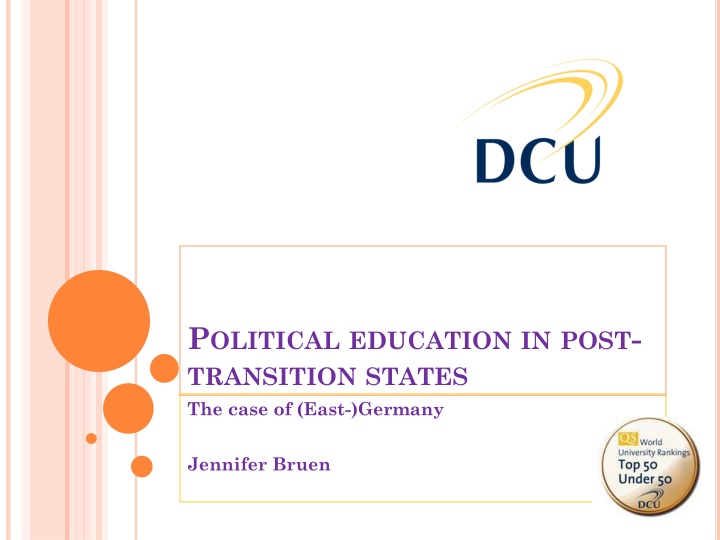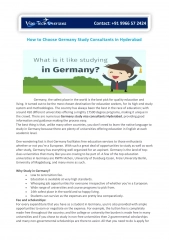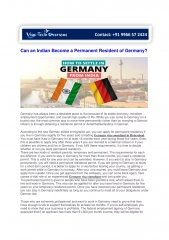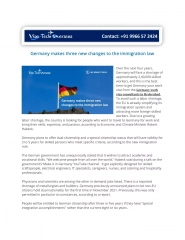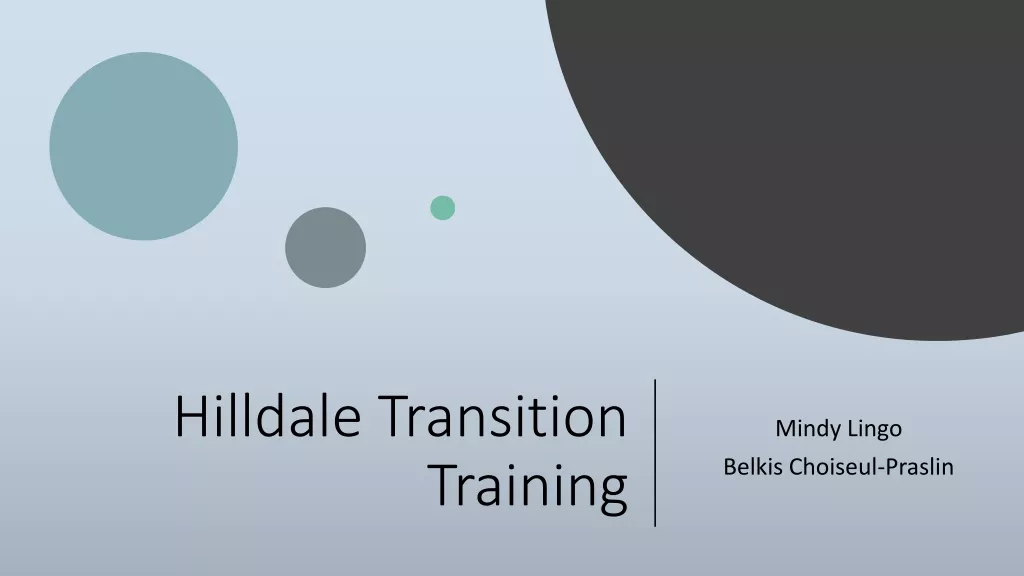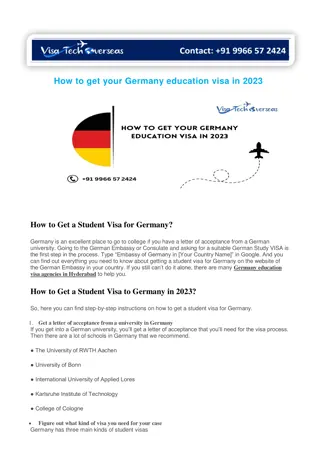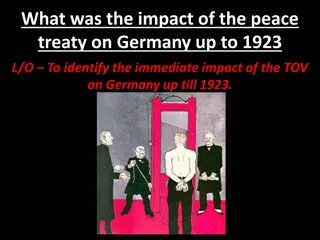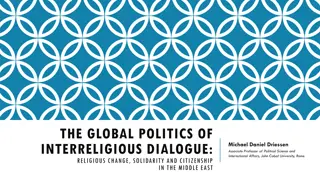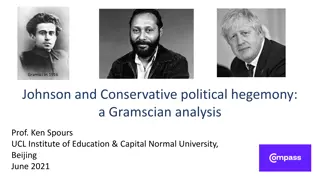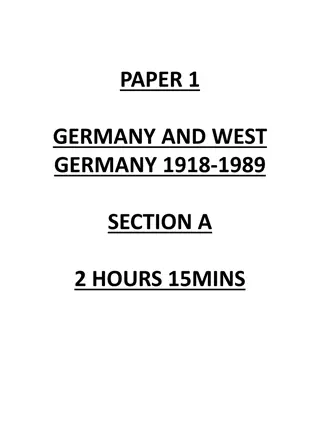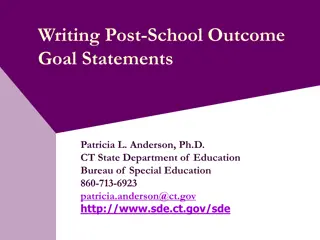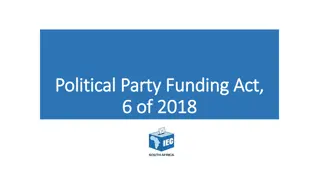Political Education in Post-Transition States: The Case of (East-)Germany
Examining the evolution of political education in Germany, this study focuses on the transition from dictatorship to democracy and its impact on citizen engagement. Comparisons between East and West Germany post-WWII shed light on the differing approaches to political education, highlighting the importance of empowering citizens to critically analyze and participate in democratic processes. The narrative explores the controversies and changes in political education over time, emphasizing the role of education in shaping active and responsible citizens.
Download Presentation

Please find below an Image/Link to download the presentation.
The content on the website is provided AS IS for your information and personal use only. It may not be sold, licensed, or shared on other websites without obtaining consent from the author.If you encounter any issues during the download, it is possible that the publisher has removed the file from their server.
You are allowed to download the files provided on this website for personal or commercial use, subject to the condition that they are used lawfully. All files are the property of their respective owners.
The content on the website is provided AS IS for your information and personal use only. It may not be sold, licensed, or shared on other websites without obtaining consent from the author.
E N D
Presentation Transcript
POLITICAL EDUCATION IN POST- TRANSITION STATES The case of (East-)Germany Jennifer Bruen
HYPOTHESIS Regions post transition from dictatorship to democracy engage in a more limited form of political education focussing on the transmission of declarative knowledge resulting in less politically active citizens.
FORMS OF POLITICAL EDUCATION Broad Narrow Focus on the transmission of correct facts Presentation & explanation of formal, legal & judicial structures Associated with maintenance of the status quo ( good citizenship) Discussion of controversial issues No right answers Designed to empower and motivate the student to critically analyse existing structures with a view to responsible transformation ( active citizenship)
FORMS OF POLITICAL EDUCATION & POST TRANSITION STATES Post transition States (GDR) Narrow _______l_______________________ Broad
POLITICAL EDUCATION IN GERMAN SCHOOLS AFTER WWII IN WEST GERMANY Politische Bildung established as school subject. Controversy around objectives in 60s & 70s. Transmission of traditions and beliefs to next generation v Enable them to change this world by political means ? 1976 Beutelsbacher Konsens berw ltigungsverbot Controversial issues must be treated as such Students must be given the skills to analyse an issue from a macro and a micro perspective
POLITICAL EDUCATION IN GERMAN SCHOOLS AFTER WWII IN THE GDR Staatsb rgerkunde established as school subject in the GDR Create socialist personalities fully fledged personalities, knowledgeable on political, specialist and general scientific matters with a firm class viewpoint and a Marxist-Leninist philosophy of life. Generate support for the Sozialistische Einheitspartei Deutschland
POLITICAL EDUCATION IN GERMANY POST REUNIFICATION IN 1990 Staatsb rgerkunde abolished. Political education reintroduced in the FNL New Guidelines published: Avoid passive acceptance of given truths Principles of Beutelsbacher Konsens to be observed. Pupils to be supported in becoming critical, mature citizens capable of: Independent judgement Self-realisation Taking responsibility as individuals re their role in democratic society
HYPOTHESIS: RHETORIC & REALITY Between 1990 and 2000, the eastern German states engaged in a more limited form of political education focussing on the transmission of declarative knowledge resulting in less politically active citizens. Explore this hypotheses further by looking at outcomes of political education. Compare attitudinal and behavioural measures in eastern and western Germany using results from the World Values Survey.
EUROPEAN/WORLD VALUES SURVEYS Investigates value orientations globally World Values Surveys Association, Institute for Futures Studies, Stockholm Methodologically rigorous, verified by the European Commission Dataset allows analysis of results for 6 key items for eastern and western German states independently in 1990, 1997 & 2000 among different age-groups.
ITEMS SELECTED FROM WVS Attitudes towards politics and society Which of the following is the most important? Maintaining order in the nation Giving people more say. Would greater respect for authority be: A good thing - A bad thing - Or don t you mind? How interested would you say you are in politics? Very Somewhat Not very Not at all
SELECTED ITEMS FROM WVS Previous political action & future political intentions Signing a petition Attending lawful demonstrations Joining in boycotts Actually done Might do Would never do
MAINTAINING ORDER V GIVING PEOPLE MORE SAY Year/item 1990 1997 1999 Region Eastern Western Eastern Western Eastern Western Germany Germany Germany Germany Germany Germany Maintaining order 23.7 20 26.8 25.7 19.8 37.6 Giving 31.7 49.5 41.3 people 42.6 52.9 34.6 more say
WOULDGREATERRESPECTFOR AUTHORITYBEAGOODTHING? 50 40 30 East West 0 20 10 West 0 East 1990 1997 1999
LEVELOFINTERESTINPOLITICS? Year/Item 1990 1997 1999 Eastern Western Eastern Western Eastern Western Germany Germany Germany Germany Germany Germany Very 34.2 18.7 19.2 22.2 16.4 10.6 Somewhat 49.7 48.5 47.1 40.0 55.3 44.1 Not very 13 24 25.9 30.3 19.6 35.1 Not at all 3.2 8.8 7.8 7.5 8.7 10.2
HAVESIGNEDAPETITION 90 80 70 60 50 East West 40 30 20 10 0 1990 1997 1999
MIGHTSIGNAPETITION 50 45 40 35 30 East West 25 20 15 10 5 0 1990 1997 1999
WOULDNEVERSIGNAPETITION 14 12 10 8 East West 6 4 2 0 1990 1997 1999
WOULDNEVER ATTENDLAWFUL DEMONSTRATIONS 25 20 15 West East 10 5 0 1990 1997 1999
POLITICALACTION: JOININGIN BOYCOTTS Year/item 1990 1997 1999 Eastern Western Eastern Western Eastern Western Germany Germany Germany Germany Germany Germany Have done 15.8 18.5 10.7 5.3 22.6 8.3 Might do 48.4 63.7 54.5 42.8 51.8 44.5 Would 35.7 17.8 34.8 51.9 25.6 47.2 never do
ATTITUDINALOUTCOMES: 1990-1999 1990 - Attitudes among 15-29 year olds reflect strong desire for transformation & political change: Strong support for giving people more say in first half of decade. Falls away at expense of desire for order in the second half. Similarly respect for authority drops in first half to rise again in 1999 Fall in the percentage very interested in politics and rise in those not very interested. Nonetheless higher level of interest than in the western states. 1999 - mood shifts towards compliance and a desire for order and authority
PARTICIPATORYOUTCOMES: 1990-1999 1990: Engagement unsurprisingly high in the eastern states directly following time of turmoil and socio-political upheaval Intention to engage in the future rises then falls over the decade in the eastern states generally ending below that of the western states. Increase in the number who would never engage in both states potentially a warning signal Cultural factors around acceptability of forms of political engagement potentially a confounding factor.
CONCLUSIONS Change in states transitioning from dictatorship to democracy is fragile. Danger of disillusionment after initial euphoria. Change requires monitoring and nurturing: Monitoring: Need for data well beyond the end of the first decade post transition Nurturing: Importance of education for transformation , education for democracy
HOWTODEVELOPPARTICIPATORY ATTITUDES, DISPOSITIONSAND COMPETENCIES HAHN (2010) Schooling Active Citizenship
TOACTIVECITIZENSHIPVIATHE CLASSROOM Open class-room climate Transformative pedagogies e.g. structured academic controversy. Negotiating skills Space for informed debate & constructive argument Interactive discussion-based activities Appropriate assessment Start young Facilitate experience of democracy at school level Appropriate teacher training
In the real world, there exists no such thing as the end of history (Meinardus 2004)
